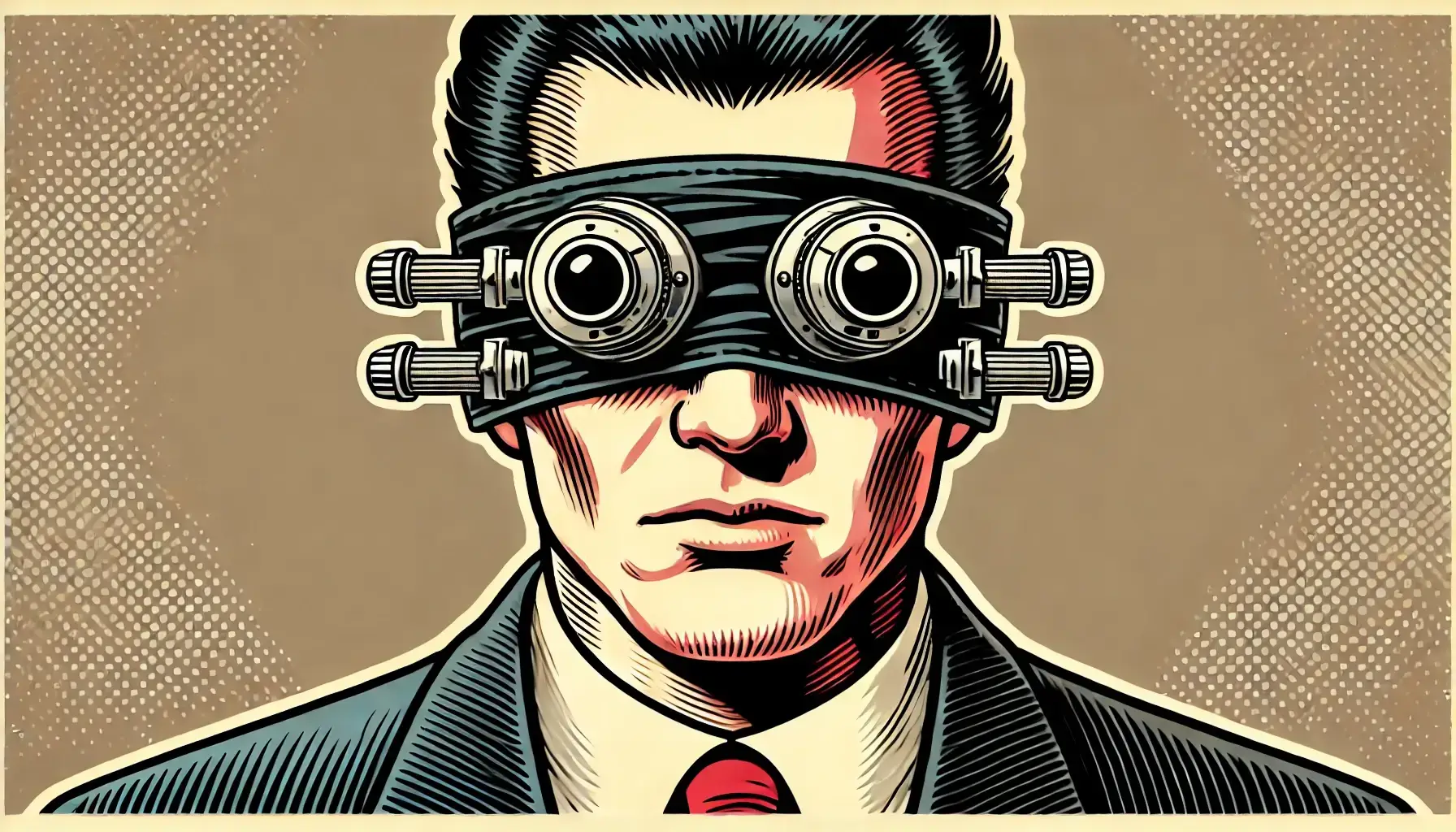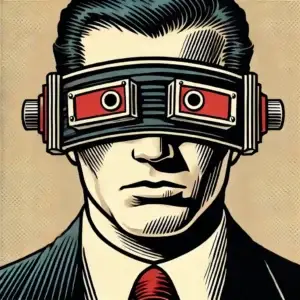Defining Present Blindness

When the Future Has Already Passed, but You’re Still Chasing It
You may suffer from present blindness if you work in the innovative spheres of technology. You’re living in a world where what once seemed like science fiction is now part of everyday life. The promises of the future—streaming media, artificial intelligence, even the digitization of your consciousness—aren’t promises anymore. They’re realities. But here’s the thing: you’re probably still chasing them as if they haven’t arrived. You’re caught in a mindset where the “next big thing” is always just around the corner, and in doing so, you might be missing what’s already here.
This isn’t just about technology moving faster than you can adapt. It’s about the stories you tell yourself, the assumptions you hold onto, and the ways they blind you to the reality of the present moment.
Future Blindness With Your Digital Persona

Think about your digital footprint for a moment. Everything you’ve posted on social media, every purchase you’ve made online, every time you’ve allowed an algorithm to predict what you’ll watch, buy, or listen to, that’s all part of a digital version of you.
But how close is it to the real you?
Chances are, the reality is far from what you’d expect. Your digital self is fractured—carefully curated on some platforms, subtly distorted by algorithms on others, and, in many ways, entirely disconnected from who you truly are. Despite this fragmentation, however, the version of you that exists online is remarkably robust. It’s complete enough for tech companies to analyze, predict, and even manipulate your behavior.
For instance, they might already know what you’ll buy next, long before you’ve even considered it yourself. In fact, they may understand your habits, preferences, and patterns in ways you’ve never consciously examined. With every click, swipe, and search, the gap between your real self and your digital identity grows—but to the machines studying you, that distinction hardly matters.
The tools to create these digital selves have outpaced your ability to understand or integrate them. And yet, you keep chasing the next iteration, the next innovation, as though the answers lie somewhere further down the road. Maybe you tell yourself that the technology still isn’t ready, that it’s not advanced enough yet. But the reality is this: it’s not the technology that’s lagging, it’s your understanding of it.
Example: Streaming Isn’t the Future. It’s the Past.
Take a step back and think about how you consume entertainment. You probably use streaming platforms, Netflix, Disney+, Spotify, whatever you prefer. Streaming was supposed to be the future of entertainment, the thing that broke down the barriers of traditional cable and gave you total control.
But is that what it really did? Or did it just recreate cable in a shinier, more fragmented way? You’ve got multiple subscriptions now, all with exclusive content locked behind paywalls, and you probably spend just as much time deciding what to watch as you would flipping through TV channels back in the day. Streaming isn’t the future; it’s the past, dressed up with better UX design and on-demand convenience.
And yet, people, investors, creatives, and executives, still act as if streaming is revolutionary, as if it hasn’t already peaked. The industry is throwing money at business models and strategies that are already outdated, chasing a “future” that has long since passed. Are you doing the same in other parts of your life? Are you focused on innovation that’s already behind you, without even realizing it?
Most people agree the streaming war is over.
Example: AI Is Ready, but Are You?
Now think about artificial intelligence. AI is everywhere right now, but the way people talk about it, you’d think it’s still in its infancy. Maybe you celebrate the breakthroughs—the new models, the faster processing, the improved accuracy. But how often are you really using AI in ways that matter? How often are you pushing it to its limits, making it work for you in ways that transform your life or your business?
The truth is, AI can already do things you haven’t even thought to ask it. It can answer questions you didn’t know you had. It can solve problems you haven’t realized exist yet. But here’s the irony: instead of fully exploring the potential of what you already have, you’re probably waiting for the “next big thing.” You’re celebrating progress without integrating it. You’re chasing the next milestone, the next version, the next breakthrough.
AI doesn’t need to advance further for it to change your life. You need to rethink how you’re engaging with it. Are you using it, or are you just applauding it from a distance?
You Have Present Blindness To The Psychic & Digital Connection
Let me ask you something: What if the barrier between the psychic realm and the digital realm isn’t technological at all? What if you don’t need new devices or fancy interfaces to begin interacting with computers in ways that feel fundamentally psychic?
Here’s what I mean: every time you post on social media, send an email, or even make a purchase online, you’re projecting your thoughts and intentions into a system that interprets them. These systems don’t just transmit, they respond. They predict, analyze, and amplify. They make decisions about you based on what you’ve shared, and sometimes, they know what you want before you do.
In a way, you’re already engaging in a kind of telecommunication that transcends the physical. Your thoughts—your digital “psychic output,” if you will—are already traveling through machines and creating feedback loops that shape your reality. But if you dismiss this idea because it doesn’t fit your preconceived notions of “psychic communication,” you’re missing the point. You don’t need a new piece of hardware to make this connection. You just need to rethink what communication means in a digital world.
You’re Living in a Fractured Present
Here’s the real problem: you’re living in a fractured present. The tools, systems, and possibilities of today are already reshaping your world, but you’re still operating as if they belong to the future. Your understanding hasn’t caught up to the reality of what’s possible. And instead of closing that gap, you let it widen. You keep telling yourself the technology isn’t ready, that the systems aren’t advanced enough. But maybe it’s not the systems that are lagging. Maybe it’s you.
Every time you create a digital facsimile of yourself—on social media, in your purchasing data, through algorithms that predict your behavior—you’re participating in something extraordinary. But instead of seeing these tools as mirrors, you treat them as external. You distance yourself from them, even as they become a part of your identity.
This isn’t just about technology—it’s about how you understand yourself in relation to it. You’ve built tools that reflect your contradictions, your fantasies, and your blind spots. But instead of using them to confront those truths, you use them as excuses to stay where you are. You tell yourself the next breakthrough will solve the problem, without realizing that the solution is already in your hands.
Shaking Off Your Present Blindness: The Present Is Enough
Stop chasing the future. The future has already passed. The tools you need are here. The systems are in place. The possibilities are endless. The only question is: will you finally catch up to the present?
